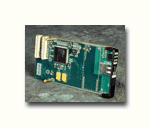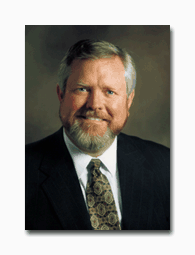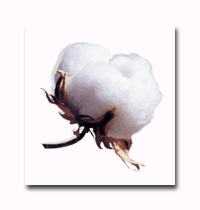March 20, 2002 – DALTON, GA. The Board of Directors for the Dalton Floor Covering Market Association (DFCMA), recognizes the need for the association to stay in tune with the changes in the floorcovering industry. As part of the Associations scope and future expansion, a new name has been adopted, by which it will be known going forward: The American Floorcovering Alliance Inc. (AFA)Bob Kokoszka, DFCMA President, stated “We believe that the new name signifies progress and will reflect the changes in our purpose and direction.” The American Floorcovering Alliance, Inc. (AFA) is a not-for-profit, national trade association serving the floorcovering industry. For more information contact the AFA at (800) 288-4101 or (706) 278-4101.
IIS Offers Modem PMC Card
IIS Offers Modem PMC Card

Victor, N.Y.-based Industrial Indexing Systems (IIS) has developed its modem PMC card option for the Emerald EMC-2000 multi-axis motion controller.The new card option offers a V.90/56k modem, remote interface for Emerald Development Environment (EDE) software tools, remote- site PC software drivers and a card that fits inside an Emerald controller.March 2002
March 2002
Robert Moore global business manager, Dyneon Specialty Additives.

Robert Moore
Dr. Freddie M. Bourland, professor of agronomy and director of the University of
Arkansas Northeast Research and Extension Center, received the 2001 Cotton Genetics Research Award
at the Cotton Improvement Conference — part of the
National Cotton Council’s 2002 Beltwide Cotton Conferences, held in Atlanta. In
addition,
Dr. John Burke, United States Department of Agriculture (USDA) plant stress and
germplasm development unit, received the 2002 Cotton Physiology Research Award at the Cotton
Physiology Conference. The following recipients of the Cotton Foundation/ Farm Press High Cotton
award were also recognized at the Beltwide Cotton Conference:
Jackie, Terry and Ricky Burris, Southwest;
George Franklin Jr., Mid-South;
Daniel Burns, Far West; and
John S. Williams Jr., Southeast. All recipients received expense-paid trips to the
conferences.
West Conshohocken, Pa.-based
ASTM International
(see “Bulletin Board”,
TW, this issue) has made the following committee appointments:
Anne Goldman, Applied Consumer and Clinical Evaluations, chairwoman, ASTM
Committee E18 on sensory evaluation of materials and products; and
Robert E. Glenn, National Industrial Sand Association, chairman, ASTM Committee
E34 on occupational health and safety.
The Netherlands-based
Cognis B.V. announced the following changes in its management:
Harold Wulff has stepped down as CEO and is now chairman of the Supervisory Board;
and
Antonio Trius replaces Wulff as CEO.


Wulff (left) and Trius
The
Chemical Fabrics & Film Association (CFFA), Cleveland, has appointed the
following new officers:
Thomas J. Carstens Jr., Sandusky Athol International, president;
Alfredo Frohlich, Proquinal S.A., first vice president; and
Eric Hagen, Uniroyal Engineered Products, second vice president.
Paris-based
Lectra has appointed
Jean-Marc Vigneron hardware products director.
Burlington Worldwide, Greensboro, N.C., has announced the following appointments
to senior management positions:
Peter Liu, president, Hong Kong office;
Ken Kunberger, executive vice president, sales;
Jeff Peck, executive vice president and general manager of synthetic and wool
products;
Mike Moody, executive vice president, general manager of cotton products;
Nelson Bebo, executive vice president and general manager of activewear and
barrier products;
Joel Futterman, executive vice president, product development, for synthetic and
wool products;
Kathy Barton, executive vice president, product development, for cotton products;
Lou D’Lando, executive vice president, new business development;
Tom Leonard, vice president, branded sales; and
Dave Locker, vice president, uniform and barrier sales.
The
Atlanta Textile Club (ATC) has named
Mike Todaro, AAPNetwork, president for 2002. He replaces
Tom Franklin, Q.E. Co. The club also elected the following officers for 2002:
Kelly Waldrop, Johnston Industries, vice president;
Don Byerly, Alkahn Labels, secretary; and
Sue Strickland, American Garment Council, treasurer.

Franklin (left) and Todaro
Murry G. Hall has retired from his position at the
Carpet and Rug Institute (CRI), Dalton, Ga. He was president of Carpet
Manufacturers of the West (CMAW) from 1974-1994, and served as West Coast liaison for CRI.
Greensboro, N.C.-based
Guilford Mills Inc. has named
Lee Lunsford president and CEO.
Uco Fabrics Inc., Rockingham, N.C., has named
Bart Van de Woestyne president and CEO.
Kellwood Co., New York City, has named
James Morgan president of its Intimate Apparel Divsion and
Melissa Dietiker vice president of sales and marketing for the daywear/ panties
unit.
North Safety Products, Cranston, R.I., has named
Karyn M. Pope customer service manager.
Fire-Dex Inc., Medina, Ohio, has named
Brett Rictor Western regional sales manager.
March 2002
Don’t Mess With Texas
I
n the mid-19th century, legendary newspaper editor Horace Greeley had firm ideas about
the direction of future prosperity in America. Greeley’s oft-quoted advice was: “Go west, young
man, go west.”
Now, some 150 years after the first utterance of those words, the American Textile
Manufacturers Institute (ATMI) is taking Greeley’s suggestion to heart. This month at ATMI’s annual
meeting in Washington, Van May, who leads the Plains Cotton Cooperative Association (PCCA) in
Lubbock, Texas, will succeed Guilford Mills’ Chuck Hayes as president of America’s premier textile
trade association.
May is a native of Crosbyton, Texas, a small town of a few thousand residents located on the
White River near Lubbock, and is a stark contrast to his last two predecessors at ATMI. Roger
Chastain of Mount Vernon Mills, president of the organization in 2000, is a soft-spoken Southerner,
content to weave in and out of the limelight as circumstance dictates. Hayes, 2001 president, is a
fiery, shoot-from-the-hip native of the Northeast with a penchant for strong language and animated
action. Van May is, well, a West Texan. Perhaps no geographical region has a stronger stereotype
stamped on the perception of the American public. West Texans are supposed to be cowboys – quiet,
honest, loyal, fierce and determined. They are the kind of people to have at your side in a fight –
and the kind you hope never to face as an adversary.

Incoming ATMI President Van May is president of the Plains Cotton Cooperative Association
(PCCA), a Texas-based, farmer-owned cotton marketing cooperative that also owns and operates
textile mills.
Critical Times
If these stereotypical characteristics do, indeed, describe Van May, then ATMI may be
well-served in the coming year. May becomes president in the midst of what might be the most
critical time in history for both the U.S. textile industry and its flagship association. The
industry has been reeling from the dual impact of disequilibrium of world currencies and the
slowdown of the U.S. economy. Layoffs and plant closings have become an all-too-common occurrence
and have filtered up to ATMI itself. In January, ATMI announced drastic cutbacks in staff because
of a budget crisis. Carlos Moore, executive vice president of the association, will step down when
a successor is found. Moore will stay with ATMI in a part-time role during the transitional period.
As well, the positions of director of government relations (chief lobbyist), an assistant director
of government relations, chief economist, and director of membership and administrative services
have been eliminated
(See ”
Washington
Outlook,” February 2002).
Layoffs and closings have hit home with May as well. His company, PCCA, recently eliminated a
yarn-dyed fabric operation. Plains Cotton Cooperative currently represents approximately 26,000
cotton producers in Texas, Oklahoma and Kansas. The company, which has gross annual sales of about
$1 billion, ships cotton all over the world and also manufactures 100-percent cotton denim for most
of the major U.S. jeans manufacturers.
When May takes the gavel from Hayes in March, he will inherit the reins of an organization in
the midst of transition. Once known as a protectionist trade association, ATMI is working hard to
change its image, particularly inside the Beltway of the nation’s capital. “The single biggest
problem we have on Capitol Hill,” May told
Textile World
, “is the perception by some members of Congress that ATMI is a protectionist organization.
It’s funny. I can go to my home town of Crosbyton, Texas, and tell 2,000 people there that the
United States has an 8.5-percent tariff on blue denim imports from India. But to sell denim in
India – if I can do it at all – I have to have an import license, and then I have to pay a
10-percent surcharge and a 40-percent tariff. Now India wants tariff reductions and an acceleration
of quota phase-outs. If I tell these people in Crosbyton that I am willing to talk about these
issues when India reduces tariffs to 8.5 percent, every one of them will say, ‘that’s fair.’ Yet,
when I say the same thing inside the Beltway, it becomes protectionism. If ATMI ever was a
protectionist organization, that is long past. All we are asking for now is a level playing field.”

“Surely, we can find other ways to help our allies fight terrorism than cutting our textile
and apparel tariffs.” — Van May, incoming ATMI president
Unification Is Key
ATMI also has suffered in the past from a somewhat disjointed industry approach to lobbying.
The fiber/textile/apparel complex has many diverse interests, and the leaders of the various
industry segments and niches have not always come together to promote common goals. In these pages
a year ago, Chuck Hayes made unity among the masses his rallying cry and set about the task of
bringing the industry together.
“I have to give a big thank-you to Chuck Hayes for what he accomplished,” May said. “He
started the unifying effort that we must continue. The year 2001 was a very successful one for ATMI
in communicating its message. We’ve done a good job this past year of getting our story told, and
we need to continue that if we are going to be successful.”
May said an extension of the effort to promote unity in 2002 will focus on bringing
additional companies into the ATMI fold. “As we move forward together, it’s time to reach out to
former members to come home and reach out to other companies that have never been a part of ATMI
but share common needs and goals.”
Staying Competitive
 For
For
2002, several items top a rather lengthy agenda for May. “The most critical need facing the U.S.
textile industry at the moment is to find the ability to stay competitive and generate the
necessary capital to stay afloat. This is paramount. To accomplish this, we need a longer
net-operating-loss carry-back period. We have asked Congress for 10 years, and we need at least
seven. We need the ability to reach back and reclaim capital from back taxes when faced with these
operating losses.” Current regulations allow for a two-year carry-back period.
The cotton industry, of which May is also a part, has its fate indelibly tied to that of the
U.S. textile industry. A pressing need, May said, is for a good farm bill that continues to keep
the U.S. cotton industry competitive. Among the primary needs of the cotton supply chain is
elimination of the 1.25-cent threshold for the issuance of Step 2 payments under the 1996 farm
bill’s Three-Step Competitiveness provisions.
Regional Trade Agreements
Further issues upon which ATMI must concentrate in 2002 include regional trade agreements
such as the Caribbean Basin Initiative (CBI) and the Andean Trade Expansion Bill. ATMI sees the CBI
as a significant benefit to U.S. manufacturers, particularly if ambiguous wording in certain key
areas can be resolved. The Andean Bill, passed by the House in November, would extend the Andean
trade preference legislation to textiles and is strongly opposed by ATMI.
Carlos Moore wrote to the Senate Finance Committee late last year about the potential harm of
the bill. “First, many important rules and regulations governing the trade preference legislation
enacted last year for the Caribbean Basin and Sub-Saharan Africa are still unresolved. The extent
to which the U.S. textile industry will benefit from that legislation depends upon how those issues
get resolved. Those same issues are present in the Andean pact legislation and they are linked to
how the CBI and Sub-Sahara issues are dealt with. Foremost among those unresolved issues are
whether fabrics will be dyed and finished in the U.S. only and whether yarns will be textured in
the U.S. only; positions which ATMI strongly supports.”
He continued: “Second, relatively little business activity has yet developed under the CBI
and Sub-Saharan statute and it is premature to rush into a similar arrangement with other
countries.
“Finally, if the provisions of S. 525 go beyond CBI/Sub-Sahara and, for example, were to
include the use of Andean fibers, yarns and fabrics, the U.S. textile industry would experience
more damage on top of an already crisis situation. In addition, our NAFTA partners and the
beneficiaries under the CBI and Sub-Sahara statutes would be at a disadvantage. Andean countries
would be granted full access to the U.S. market as though they were partners in a free trade
agreement, yet they would have made no concessions of their own. If they were to be granted this
extraordinary benefit, it seems clear that their interest in joining into the Free Trade of the
Americas Agreement would be greatly diminished.”
The CBI issue is somewhat different. As it is currently worded, the legislation is unclear
about whether fabrics will be dyed and finished, and yarn textured in the United States only, as
was ATMI’s original intent.
May said a compromise position is now before Congress that will satisfy most of the affected
parties. “We hope to see that compromise enacted into legislation so that all of the benefits of
CBI can be realized, throughout the supply chain all the way to the retailers’ shelves.”
Other Trade Issues
Other issues of immediate import to both ATMI and the industry, according to May, are:
ensuring the government does not lower U.S. tariffs or accelerate quota reductions slated for 2005,
as has been sought by many foreign nations; aggressively seeking to open new foreign markets to
U.S. exports; stricter enforcement of existing U.S. trade laws; strengthening of U.S. efforts to
combat transshipments; and ensuring any accord or assistance package for Pakistan minimizes impact
on the U.S. textile and apparel industries. Pakistan is, of course, a sensitive issue, both within
the U.S. textile industry and the American government. May, ATMI and most others within the
industry recognize the need to support those nations that assist the United States in its fight
against terrorism. It is the manner of assistance that is at issue.
“It is in our country’s national interest to provide an aid package that doesn’t harm our
basic industries, including textiles. Surely, we can find other ways to help our allies fight
terrorism than cutting our textile and apparel tariffs,” May said. “We need to help them in such a
way that all Americans share the burden, not just the U.S. textile and cotton industries.”
For the long-term trade situation, the U.S. industry continues its preparation for the year
2005 and the reduction of import quotas. “The infrastructure of the U.S. industry is the best in
the world,” May said. “We are sitting right in the middle of the world’s biggest market. We are
investing $2 billion a year in new equipment and improvements. We are putting our money where our
mouth is. To stay competitive, we must continue to identify those markets and products in which we
can compete, and we need to do a better job of partnering with garment manufacturers in Mexico and
the Caribbean. I believe that we are rocking along the bottom right now, but that things will get
better.”
Despite the current economic conditions, the political position of both ATMI and the industry
is improving. For years, leaders of the U.S. textile industry have complained that the government
is negotiating away its business base, offering textile concessions in order to achieve other trade
and foreign policy objectives. For now, however, the industry has the government’s attention,
including a commitment from the Bush administration not to enter into any harmful trade agreements.
Getting The Message Out
 ATMI has improved its profile on Capitol Hill and in the White House and
ATMI has improved its profile on Capitol Hill and in the White House and
is finally beginning to communicate the message of a more unified industry.
Yet the challenges ahead are immense. The strength of the dollar, a recessionary economy,
nebulous trade agreements and coming WTO requirements pose stiff challenges for the industry. May
is optimistic that the industry will not only be able to weather the storm, but will eventually
flourish. As for his own legacy, he has but one ultimate goal for his tenure at ATMI, which he
articulates in his measured West Texas drawl: “If people can look back and say that I did more good
than harm, I’ll be happy.”
March 2002
PGI In Restructuring Negotiations
PGI In Restructuring NegoationsPolymer Group Inc. (PGI), North Charleston, S.C., has announced it is in negotiations with a third party. The negotiations could lead to financial restructuring. Exact terms are still under discussion, but they will probably include a reduction in outstanding debt in exchange for the issuance of a substantial amount of new equity.PGI also announced it continues to have substantial liquidity, with approximately $50 million in cash and short-term investments available to fund its operations.March 2002
Peter Dornier Owner Of Lindauer Dornier Passes Away
Peter Dornier, Owner OfLindauer Dornier, Passes AwayDipl. Ing. Peter Dornier passed away at his home in Lindau, Germany, on January 28, 2002. He was 85. Dornier was the sole owner of Lindauer Dornier GmbH, the largest producer of weaving machines in Germany.Dornier was the second son of aircraft pioneer Dr. Claude Dornier. He began his career in 1944 as anairplane design engineer in his fathers company.For his achievement in design, he received, along with other leading engineers, the 1943 Trophy of Honor of the Carl-Lilienthal-Association of Aeronautics, Germany.Dornier established Lindauer GmbH in 1950. In the early 1960s, Dornier started a second manufacturing program consisting of specialty machinery for the textile and plastic foil industries.Dornier also found time to develop 50 patents that were registered in his own name.In 1978, he expanded the company with the founding of the American Dornier Machinery Corp. in Charlotte, N.C.In 1985, Daimler Benz AG acquired majority ownership of the Dornier group of companies, with Dornier taking full ownership of Lindauer Dornier GmbH.In 1986, he created the Peter Dornier Trust Fund, a benefactor to social and environmental improvements in the community.After 50 years as head of the company, Dornier handed over management of the company to his son, Peter D. Dornier, at the beginning of 2001.March 2002
Imports Show First Decline Since 1988
By James Morrissey, Washington CorrespondentReflecting the soft U.S. economy and what many economists describe as a major soft goods recession, textile and apparel imports for the first time since1988 declined last year. U.S. Commerce Department data for 2001, show that textile and apparel imports of 32.8 billion square meter equivalents were down by 0.6 percent from 2000. While the decline was minor, it reflects a reversal of a trend that had seen a steady annual rise of both textile and apparel imports. Of particular significance was a 9 percent drop in apparel imports from Mexico, which in recent years had increasingly been displacing imports from the Far East and Orient, and under terms of the North American Free Trade Agreement (NAFTA) generally contained U.S. fabric and yarn.Running counter to the overall downward trend, imports from Pakistan, South Korea, Cambodia and Indonesia showed significant increases and nearly offset the decline in imports from Mexico and the Caribbean.According to trade officials at the American Textile Manufacturers Institute (ATMI), Asian nations have become more price-competitive as a result of currency devaluations, and they are eating into what for some time had been a competitive advantage of NAFTA countries.The year-end data also show that U.S. exports of textiles and apparel measured in dollars, also declined, reversing a 15-year trend of annual increases. Textile exports of $10 billion were down 4.3 percent and apparel exports valued at $6.5 billion were off 20.3 percent. This resulted in a record-breaking annual trade deficit of $62 billion. As was the case with imports, much of the decline in exports is attributed to less trade with Mexico and the Caribbean Basin nations.
Lovejoy Develops New Couplings Line
Lovejoy Develops New Couplings Line

Downers Grove, Ill.-based Lovejoy Inc. has introduced new curved-jaw (CJ) flexible elastomeric and jaw in-shear (JIS) elastomeric couplings.The CJ couplings line has been expanded to include larger sizes, including hub outside diameters ranging from 30 through 420 millimeters (mm). It can accommodate applications driven either by electric motor or by internal-combustion engine, with nominal torque ratings.The new JIS couplings line has six larger sizes extending maximum bore up to 9 inches. Lovejoy also has introduced a JIS spacer-type series intended as non-lubricated, drop-in replacements for grid spacer couplings.March 2002
DuPont Forms TextilesandInteriors Subsidiary
DuPont FormsTextilesandInteriors SubsidiaryWilmington, Del.-based DuPont has formed DuPont TextilesandInteriors (DTI), a subsidiary that becomes the largest integrated textile fiber and interiors company in the world, according to DuPont.DTI will comprise two businesses, each with subgroups. TextilesandInteriors will include apparel, home and industrial, and flooring. Intermediates will include nylon; Terathane® and polyester intermediates, specialties and joint ventures.Upon formation of this subsidiary, we will become the largest player in the worldwide textile and interiors business with a portfolio of brands that is second to none, and it will enjoy the number-one position in the six markets that comprise 75 percent of its revenue, said Richard Goodmanson, executive vice president and COO, DuPont, and chairman, DTI.With the formation of the new subsidiary come new leadership appointments: DuPont ApparelandTextile Group Vice President and General Manager Steve McCracken Textiles and Interiors; and DuPont Chemicals and Polyester Group Vice President and General Manager George MacCormack Intermediates. Under McCracken and MacCormack, subgroups will be led by the following: Bill Ghitis apparel; Alan Wolk flooring; Carol Gee consumer brands; Dave Trerotola home and industrial; and Ken Wall nylons, intermediates and specialties.The new company will have the largest research and development budget in the industry, with $170 million earmarked for product and process innovation in 2002, according to DuPont.March 2002
Springfield Introduces Airo-Soft Hydrophilic
Springfield IntroducesAiro-Soft HydrophilicSpringfield Occupational Apparel, Jericho, N.Y., has enhanced its woven and knitted Airo-Soft workwear fabrics with a hydrophilic finish that wicks moisture away from the skin to evaporate on the fabric surface. The durable, easy-care fabrics also have soil release properties.Airo-Soft Hydrophilic workwear fabrics feel great and look much better at the end of the workday, even under extremely warm, humid conditions, said Frank Reese, vice president. Plus, the fabric maintains the strength, color retention and high wearability standards that are imperative in all Springfield fabrics.The fabrics are available in a variety of weights and can be dyed to customer specifications.March 2002




